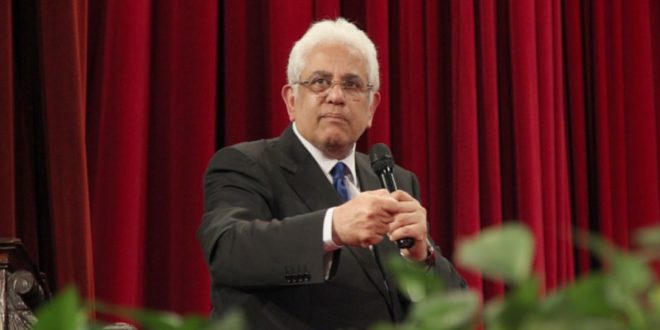In his seminar at Cairo University, major hall, at the invitation of the President of the University Prof. Jaber Nassar and in the presence of deans of faculties, faculty members and hundreds of students, Dr. Hossam Badrawi delivered a lecture on the role of universities in society.
At the end of the dialogue, Dr. Hossam answered the students’ questions. Many of them gathered around him with love and respect for taking commemorative photos, asking for his signature on his book “Education, Opportunity For Salvation” for each of them.
“Over the centuries, universities have occupied a number of social functions. The diversity of such functions forms the unique personality acquired by a university. All universities need to “multiply”, “spread” and “evolve” at the same time. Also, they need to know the causes of change or the reasons for adhering to traditions. To do so, they must question what has been gained and also test different patterns of thinking existing in society. A university must also take the risk of providing all that is unexpected to the societies that see it easier to keep things as they are and even fight renewal and change in order to preserve the reality that has been getting used to it even though it is criticized,” Dr. Badrawi said In the lecture.
“A university is trying to meet four goals: welfare, order, meaning and truth. Together, these objectives represent the cause of establishing and existence of these universities,” he added.
A university focuses on the well-being of society either by preparing its students for constructive integration within the labor market, through the acquisition of knowledge and skills which constitute a tool for progress and development, or developing research and innovation to strengthen the economic strength of a particular nation. The aim behind that is to meet social needs effectively and economically. Therefore, the beneficial aim of investments made by governments and the parties interested in organizing the physical structure of their communities into their universities is justified. There is a significant and measurable return on individuals and on society.
As for the social system, a university helps society to be a “harmonious society” in which diverse groups exchange references and make science, knowledge and technical skills appropriate and proper. This requires development of skills and knowledge areas related to civil integration and using them in teaching and adapting them to current social needs. Higher education also defines the “qualifications” of persons. The certificates of higher education and postgraduate studies of all kinds become passage for those to respectable positions with appropriate salaries at different levels of society. Universities are the most important source for the organization of higher qualifications.
In the issue of meaning, a university deals with life postulates as defined by society. It examines the different worldviews, both ancient and new. It reconsiders the stable and accepted intellectual references, and re-organizes the data according to the new and different standards, whether intellectual, moral or aesthetic. Enrichment of meaning lies in the comprehensive and complete knowledge of these different types of information and perspectives, questioning of postulates and the reorganization of the world as we know it in this light. This results in the university ability to refer to possible reforms in society, which is the basis for any civilized transition made by nations.
When dealing with the question of searching for the truth, a university explores the unknown as the natural order of which humanity is a part. The goal from this is not only to try to destroy the walls of ignorance, but also to deeply question how man understands the universe around him. The stages of this effort go along the method of scientific reasoning to be followed by universities in the study of various sciences which includes skepticism, imagination and assimilation. It is a process that is sometimes fraught with risks that may lead us to error and failure, which are accepted by science as long as they are done with the approach of scientific reasoning and proof. However, search for the truth remains a basic input to the university’s function.
“As a necessary institution for the nation and as a building block for the cultural development of the region, a university should survey the environment in which it arises and recognize the complexities of possible change (that is, academic freedom). Universities must develop their vision towards their commitments to this transformation and determine how to use their assets in the best possible ways (i.e., institutional autonomy). In practice, the above means identifying medium-term strategies that lead to the development of institutional policies that can be tested, measured and validated (this imposes accountability),” he added.
For details and photos:
https://www.facebook.com/pg/hossambadrawi/photos/?tab=album&album_id=1180293928724732
 Dr. Hossam Badrawi Official Website
Dr. Hossam Badrawi Official Website


